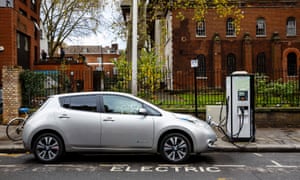
All new cars sold in Europe will be electric within less than two decades, driven by government support, falling battery costs and economies of scale, a Dutch bank has predicted.
However, ING warned that with battery-powered vehicles accounting for 100% of registrations in 2035 across the continent, European carmakers would lose out to their rivals in the US and Asia who already lead on battery production.
The forecast is much more aggressive than most other projections, such as the UK’s National Grid which on Thursday said it expects 90% of new cars in Britain to be electric by 2050.
France’s commitment last week to banning new petrol and diesel car sales by 2040 suggests it also thinks the roll-out of electric vehicles will be slower than ING’s report expects.
However, the bank said that it believed pure electric cars would “become the rational choice for motorists in Europe” sometime between 2017 and 2024, as their car showroom prices fall, their ranges increase and charging infrastructure becomes more widespread.
By 2035 all new cars sold in Europe could be electric
Battery electric vehicle market share in Europe, %
0
20
40
60
80
100
2016
2020
2024
2028
2032
No comments:
Post a Comment